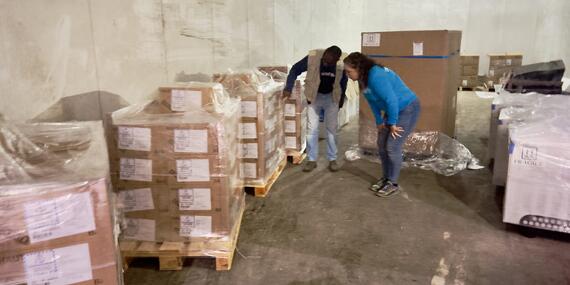Today's top news: Occupied Palestinian Territory, Ukraine

Occupied Palestinian Territory
The Under-Secretary-General for Humanitarian Affairs, Martin Griffiths, has described the situation in Gaza as “impossible” for people in need and those trying to help them. In a social media post, he called for a stop to the fighting, stressing the many major obstacles to getting aid into and across Gaza.
Mr. Griffiths pointed to the multiple inspections required, long queues of trucks, and difficulties at crossing points. Inside Gaza, he underscored that aid operations face constant bombardments, with aid workers themselves killed, and said some convoys have been shot at. Other challenges include poor communications, damaged roads, and delays at checkpoints.
The Under-Secretary-General said Gaza’s traumatized and exhausted population is being crammed into an increasingly small sliver of land, with shelters having long exceeded their full capacity.
An estimated 100,000 internally displaced people have recently arrived in Rafah, amid an intensification of hostilities in Khan Younis and Deir al Balah, as well as evacuation orders by the Israeli army. This latest influx of people is further straining already overcrowded shelters and limited resources.
UN agencies and humanitarian partners continue to do all they can to meet the growing needs of civilians in Gaza. Yesterday and today, the World Food Programme – together with the UN Relief and Works Agency for Palestine Refugees in the Near East (UNRWA) and the NGO Global Communities – conducted a large-scale food distribution for some 10,000 displaced families in makeshift camps in Rafah, with enough supply for 10 days. WFP also provided food parcels to some 10,000 people at two distribution sites in Rafah, with additional distributions taking place at shops.
Meanwhile, there has been a notable increase in the number of Palestinians displaced in the West Bank since 7 October. Over the past 12 weeks, more than 2,200 Palestinians – almost half of them children – have been displaced due to settler violence, access restrictions, and the destruction and demolition of homes.
Ukraine
The Humanitarian Coordinator in Ukraine, Denise Brown, strongly denounced a wave of attacks that began last night and lasted through this morning on populated areas across the country. Nearly 20 civilians were reportedly killed, with more than 120 others injured, according to preliminary information from Ukrainian authorities. The strikes also damaged homes, schools, hospitals, a metro station, a shopping mall and energy infrastructure.
In a statement, Ms. Brown noted that indiscriminate attacks and the intentional targeting of civilians and civilian objects are strictly forbidden.
The Humanitarian Coordinator stressed that today’s series of attacks – reportedly one of the largest-scale since the start of Russia’s invasion – was just the latest example of why 2023 has been another year of enormous suffering for people in Ukraine.
In response to the strikes, humanitarian partners mobilized emergency support for affected people in Dnipro, Lviv, Kharkiv, Kyiv, Odesa, Zaporizhzhia and other cities. Alongside local authorities, they are providing construction materials for emergency repairs, medical and psychological assistance, tents with heating and hot meals for people who are unable to access their homes due to the destruction, amid harsh winter conditions.
